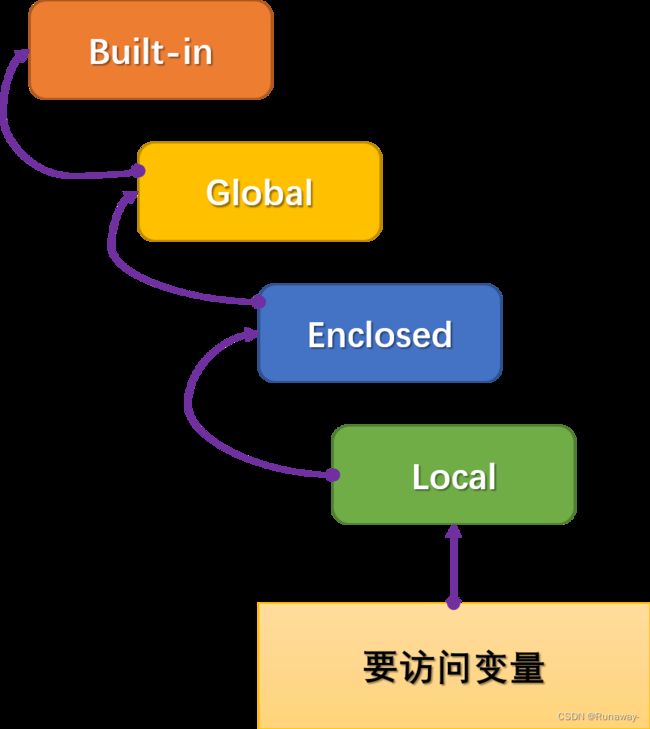- Python之上下文管理器
zhuxy604
PythonPython
以下文章总结自《headfirstpython》读书笔记引子从python处理一个文件说起,在Python中打开一个文件时,一般的代码逻辑如下:file=open('test.txt')forlineinfile:print(line)file.close()以上代码主要做了3件事:1)打开一个文件;2)处理文件,读取每一行并打印出来;3)关闭文件但是对大多数程序员而言,处理文件常推荐使用的是一个
- pip 命令安装
若纷飞
环境配置pip命令安装liunx
转:https://pip.readthedocs.io/en/stable/installing/安装我需要安装pip吗?如果您使用从python.org下载的Python2>=2.7.9或Python3>=3.4,或者您正在使用virtualenv或pyvenv创建的虚拟环境中工作,则已经安装了pip。只需确保升级pip。用get-pip.py安装要安装pip,请安全下载get-pip.py。
- python - 上下文管理器
你是猴子请来的救兵吗!!
python杂记python
一、什么是上下文管理器你是不是这样读过文件withopen("file","r")asf_reader:content=f_reader.readlines()为什么你要用"with"呢,因为在这段读取文件代码结束后,会自动执行close()with是一个神奇的关键字,它可以在代码中开辟一段由它管理的上下文,并控制程序在进入和退出这段上下文时的行为,即进入时打开文件,并返回文件对像,退出时关闭文件
- Python进阶之-上下文管理器
小佟
python上下文管理器python数据库服务器
本文介绍了Python中的上下文管理器,包括其基本概念、组成、标准库中的应用、自定义上下文管理器的实现以及contextlib模块的使用。重点强调了上下文管理器在资源管理、异常处理和代码整洁性方面的优势。✨前言:什么是上下文管理器?在Python中,上下文管理器是支持with语句的对象,用于为代码块提供设置及清理代码。上下文管理器广泛应用于资源管理场景,例如文件操作、网络连接、数据库会话等,其目的
- Python结合pyhdfs模块操作HDFS分布式文件系统
唐僧不爱八戒
pythonhdfs开发语言
使用python操作hdfs本身并不难,只不过是把对应的shell功能“翻译”成高级语言,我这里选用的是hdfs,下边的实例都是基于hdfs包进行的。1:安装由于我的是windows环境(linux其实也一样),只要有pip或者setup_install安装起来都是很方便的pipinstallhdfs2:Client——创建集群连接fromhdfsimport*client=Client("ht
- python:函数提高
muxue178
python开发语言
1.变量的作用域与变量修改局部变量:定义在函数内部,生存范围在函数内部。全局变量:在函数内部外部都可生效的变量。一.局部变量:deftest1():a=100print(a)test1()print(a)运行结果100Traceback(mostrecentcalllast):File"D:/pycharm项目/数值类型.py",line5,inprint(a)NameError:name'a'i
- 超详细!Python当中的pip常用命令大全!
程序媛小本
pythonpip开发语言
相信对于大多数熟悉Python的人来说,一定都听说并且使用过pip这个工具,但是对它的了解可能还不一定是非常的透彻,今天小编就来为大家介绍10个使用pip的小技巧,相信对大家以后管理和使用Python当中的标准库会有帮助。安装当然在Python3.4版本之后以及Python2.7.9版本之后,官网的安装包当中就已经自带了pip,用户直接在安装完Python之后就可以直接使用,要是使用由virtua
- Python Requests 库基本命令
一口牛肉夹馍
python
PythonRequests库基本命令1、发送请求2、请求参数3、属性3.1、常用属性3.2、其他属性4、异常5、主要方法解析6、SSL证书验证1、发送请求#发送get请求r=requests.get("http://httpbin.org/get")#发送post请求r=requests.post("http://httpbin.org/post",data={"key":"value"})2、
- Lua语言的网络编程
沈韶珺
包罗万象golang开发语言后端
Lua语言的网络编程引言在现代软件开发中,网络编程是一个非常重要的领域。不同于其他编程语言,Lua语言以其简洁、灵活和高效著称,被广泛应用于游戏开发、嵌入式系统以及各种脚本环境中。尽管Lua在网络编程方面的库和框架并不如Java、Python等语言丰富,但其轻量级的特性和易于嵌入的特性使得Lua成为许多网络应用的理想选择。本篇文章将讨论Lua语言在网络编程中的应用,介绍如何使用Lua进行网络编程的
- Visual Basic语言的物联网
宓婉清
包罗万象golang开发语言后端
物联网与VisualBasic的结合引言在信息技术迅速发展的今天,物联网(InternetofThings,IoT)作为一个新兴的技术概念,正逐渐改变着我们的生活方式。从智能家居到城市管理,物联网将各种设备连接到一起,使其能够相互交流和协作。而在众多开发语言中,VisualBasic(VB)因其易用性和强大功能,成为物联网应用开发的一个重要选择。本文将探讨物联网的基本概念、VisualBasic的
- Python零基础入门:从入门到实战的10个必学知识点
小尤笔记
python数据库服务器
Python零基础入门到实战,需要掌握一系列基础且关键的知识点。以下是10个必学的知识点及其代码演示:CSDN大礼包:《2024年最新全套学习资料包》免费分享1.变量与数据类型变量:用于存储数据,可以随时修改其存储的值。数据类型:Python有丰富的数据类型,包括整数(int)、浮点数(float)、字符串(str)、布尔型(bool)等。#变量赋值a=10#整数b=3.14#浮点数c="Hell
- 第14篇:从入门到精通:掌握python上下文管理器
猿享天开
python从入门到精通python开发语言
第14篇:上下文管理器内容简介本篇文章将深入探讨Python中的上下文管理器(ContextManager)。您将了解上下文管理器的概念与用途,学习如何实现自定义的上下文管理器,以及如何使用contextlib模块来简化上下文管理器的创建与使用。通过丰富的代码示例,您将能够灵活地使用上下文管理器来管理资源,提升代码的安全性和可维护性。目录上下文管理器概述什么是上下文管理器上下文管理器的用途使用wi
- Python request库简介与操作
唐僧不爱八戒
python
介绍首先让我们来看Requests官方的介绍:RequestsisanelegantandsimpleHTTPlibraryforPython,builtforhumanbeings.翻译过来就是:Requests是为人类写的一个优雅而简单的PythonHTTP库。这个介绍很直白了,让我们先来感受一下Requests的威力。importrequests#发送请求response=requests.
- 开源的基于Python的电脑自动化操作
云博士的AI课堂
操作技巧AI工具应用实践python自动化RPA桌面自动化软件自动化开源自动化
开源的Python技术可以用于实现电脑自动化操作。这些技术可以执行从简单的桌面自动化到复杂的系统管理任务,以下是一些常用的开源Python库和工具:1.PyAutoGUI功能:PyAutoGUI是一个用于跨平台桌面自动化的Python库,支持鼠标点击、键盘输入、屏幕截图、图像识别等操作。应用场景:自动化重复性操作、点击按钮、填写表单、网页导航等。特点:跨平台支持(Windows、macOS、Lin
- Python中的pip命令安装与使用
小尤笔记
pythonpipwindows开发语言
Python中的pip命令简介pip是Python的包管理工具,用于安装和管理Python包。它允许你从Python包索引(PythonPackageIndex,简称PyPI)下载并安装第三方库和工具。pip是Python官方推荐的包管理工具,并且从Python2.7.9和Python3.4开始,pip已经与Python一起发行。安装pip对于大多数现代Python安装,pip已经默认安装。如果你
- Vue和Vue-Element-Admin(十):HTML和CSS快速学习笔记
A叶子叶
#Vue与Web开发vue.jshtmlcss
目录html标签分类网页布局盒子模型浮动定位css标签选择flex布局transform转换Vue开发tipsless和scssVScode常用插件后端语言框架很多,Java适合企业级应用(规范且稳定),Go适合高并发场景(比如云上产品),Python框架(bottle,tornado,django)简单且快速,也天然适合数据分析场景,PHP适合快速建站,前端变化小,所见即所得,因此抽空记录下学习
- OpenCV图像旋转90度的最简单方法
时光荏苒-
opencv计算机视觉人工智能OpenCV
OpenCV是一个功能强大的计算机视觉库,提供了许多图像处理和计算机视觉算法。在OpenCV中,图像旋转是一项常见的操作。本文将介绍如何使用OpenCV将图像旋转90度的最简单方法。步骤1:导入OpenCV库在Python中使用OpenCV库需要先导入库。可以使用以下代码导入OpenCV库:importcv2步骤2:读取图像使用OpenCV读取图像需要使用cv2.imread()函数。该函数接受一
- 【机器学习BDT】python代码实现(下)
mcoc132
Python机器学习机器学习python人工智能
文章目录BDT(BootstrapDecisionTree)python实现导入库分类树主体代码回归树主体代码输出函数完整代码后续可能添加的功能BDT(BootstrapDecisionTree)python实现代码仅供参考导入库importCART树_自己写importnumpy其中一个库之前写的分类树主体代码在原始数据权重基础上使用更新的数据权重以更新BDT模型.def分类树(self,BDT
- 如何在OpenCV Python中对图像执行位异或操作?
勤奋的可乐
Opencvopencvpython人工智能计算机视觉机器学习神经网络深度学习
彩色图像(RGB)有三个通道:红色、蓝色和绿色。图像表示为3维numpy数组。图像的像素值使用8位无符号整数(uint8)存储,范围为“0到255”。对两个图像执行位异或运算是在相应图像的像素值的二进制表示上执行的。以下是执行两个图像的位异或操作的语法–cv2.bitwise_xor(img1,img2,mask=None)这里,img1和img2是两个输入图像,mask是一个掩码操作。步骤要计算
- Robyn与FastAPI全面对比:选择最适合你的Python Web框架
我就是全世界
fastapipython前端
引言1.1背景介绍在当今的软件开发领域,选择合适的Web框架对于项目的成功至关重要。Python作为一种广泛使用的编程语言,其生态系统中涌现出了众多优秀的Web框架,如FastAPI和Robyn。FastAPI自发布以来,因其高性能、易用性和自动生成API文档的特性,迅速成为开发者的首选。而Robyn,作为一个结合了Python和Rust优势的新兴框架,以其异步处理能力和简洁的API设计,也吸引了
- Python中的多线程实现与GIL(全局解释器锁)的影响
清水白石008
Python题库python开发语言python服务器开发语言
Python中的多线程实现与GIL(全局解释器锁)的影响在Python编程中,多线程是一种常见的并发编程技术,它允许程序同时执行多个任务。然而,Python的全局解释器锁(GIL)对多线程的性能和并发性有着显著的影响。本文将深入探讨如何在Python中实现多线程,并详细解释GIL的影响,以及如何在实际编程中应对其带来的挑战。一、引言Python的多线程编程允许我们在一个进程中同时执行多个线程,从而
- python GIL 全局解释器锁
嘉嘉嘉Jessie
Pythonpython开发语言后端
GIL的历史由来:python中的GIL详解-可可的私房菜-博客园(cnblogs.com)总结:Python的多线程在多核CPU上,只对于IO密集型计算产生正面效果;而当有至少有一个CPU密集型线程存在,那么多线程效率会由于GIL而大幅下降。个人理解:GIL只是CPython的产物(参考:python解释器)GIL:创建python时只考虑到单核,为了解决多线程数据的完整性和同步状态的一把全局排
- python中如何判断一个键是否在一个字典中,如果在打印输出在,用代码示例?
神笔馬良
pythonlinux前端
问题描述:python中如何判断一个键是否在一个字典中,如果在打印输出在,用代码示例?问题解答:在Python中,你可以使用in关键字来判断一个键是否存在于字典中。这个操作会返回一个布尔值,如果键存在于字典中则为True,否则为False。my_dict={'a':1,'b':2,'c':3}#判断键'a'是否在字典中if'a'inmy_dict:print("'a'存在于字典中")else:pr
- Python GIL 全局解释器锁 详解
实相无相
python教程pythonGIL全局解释器锁
PythonGIL详解在Python的多线程编程中,一个常被提及的概念是全局解释器锁(GIL,GlobalInterpreterLock)。它是Python解释器设计中的一个重要特性,对多线程应用的性能和行为产生了深远影响。在这篇文章中,我们将深入探讨GIL的工作原理、影响、以及如何在Python编程中应对这一限制。什么是GIL?GIL是Python解释器的一种锁机制,主要用于保护对Python对
- Python ORM
svygh123
python编程python开发语言
Python中的ORM(Object-RelationalMapping)框架,其中最著名和广泛使用的两个是SQLAlchemy和DjangoORM。1.SQLAlchemySQLAlchemy是Python中功能最强大的SQL工具库之一,它不仅提供了ORM功能,还提供了核心的数据库SQL工具。它允许你用Python类来表示数据库表,并且可以使用Python代码而不是直接写SQL查询语句来操作数据
- python-orm框架
暮鼓晨钟nbv
pythonorm框架
首先见代码:#!/usr/bin/envpython3#encoding:utf-8#@File:__init__.py.py#@Author:LeonChu#@Time:2019-03-1515:45classField(object):def__init__(self,name,column_type):self.name=nameself.column_type=column_typedef
- python orm框架有哪些
hakesashou
python基础知识python数据库sqlite
ORM概念ORM(ObjectRalationalMapping,对象关系映射)用来把对象模型表示的对象映射到基于SQL的关系模型数据库结构中去。这样,我们在具体的操作实体对象的时候,就不需要再去和复杂的SQL语句打交道,只需简单的操作实体对象的属性和方法。ORM技术是在对象和关系之间提供了一条桥梁,前台的对象型数据和数据库中的关系型的数据通过这个桥梁来相互转化。Python中常用的ORMSQLO
- python:如何播放 .spx 声音文件
belldeep
pythonpythonpyaudioffmpeg
FFmpeg可以将.spx文件转码成.wav文件,基于pyaudio和wave实现播放.wav声音文件。whereffmpegD:\FFmpeg\64\ffmpeg.exepipinstallpyaudiopipinstallwave编写play_spx.py如下#-*-coding:utf-8-*-"""播放*.spx音频文件"""importosimportsysimporttimefromt
- 在Python中使用“判断字典键是否存在的方法“进行键的查找
代码之旅创造者
python开发语言Python
在Python编程中,经常需要在字典中查找某个特定的键是否存在。字典是Python中常用的数据结构之一,它由一系列键-值对组成,每个键都是唯一的。为了判断一个键是否存在于字典中,我们可以使用in关键字或has_key()方法。下面将介绍如何使用in关键字和has_key()方法来判断键是否存在,并提供相应的源代码示例。使用in关键字判断键是否存在在Python中,使用in关键字可以判断一个键是否存
- 商品价格跟踪爬虫:监控多个电商网站的商品价格波动
Python爬虫项目
2025年爬虫实战项目爬虫python开发语言
1.引言在当前的电商环境中,商品价格变化快速且频繁。对于消费者而言,能够实时跟踪商品价格的波动是一项非常实用的功能。而对于商家来说,了解竞争对手的价格走势也是一种重要的商业策略。因此,开发一个商品价格跟踪爬虫,能够帮助我们及时掌握价格动态。本文将详细介绍如何使用Python实现一个高效的商品价格跟踪爬虫,并对多个电商网站进行价格监控。2.爬虫概述爬虫的作用是模拟浏览器向目标网站发送请求,获取商品页
- 多线程编程之理财
周凡杨
java多线程生产者消费者理财
现实生活中,我们一边工作,一边消费,正常情况下会把多余的钱存起来,比如存到余额宝,还可以多挣点钱,现在就有这个情况:我每月可以发工资20000万元 (暂定每月的1号),每月消费5000(租房+生活费)元(暂定每月的1号),其中租金是大头占90%,交房租的方式可以选择(一月一交,两月一交、三月一交),理财:1万元存余额宝一天可以赚1元钱,
- [Zookeeper学习笔记之三]Zookeeper会话超时机制
bit1129
zookeeper
首先,会话超时是由Zookeeper服务端通知客户端会话已经超时,客户端不能自行决定会话已经超时,不过客户端可以通过调用Zookeeper.close()主动的发起会话结束请求,如下的代码输出内容
Created /zoo-739160015
CONNECTEDCONNECTED
.............CONNECTEDCONNECTED
CONNECTEDCLOSEDCLOSED
- SecureCRT快捷键
daizj
secureCRT快捷键
ctrl + a : 移动光标到行首ctrl + e :移动光标到行尾crtl + b: 光标前移1个字符crtl + f: 光标后移1个字符crtl + h : 删除光标之前的一个字符ctrl + d :删除光标之后的一个字符crtl + k :删除光标到行尾所有字符crtl + u : 删除光标至行首所有字符crtl + w: 删除光标至行首
- Java 子类与父类这间的转换
周凡杨
java 父类与子类的转换
最近同事调的一个服务报错,查看后是日期之间转换出的问题。代码里是把 java.sql.Date 类型的对象 强制转换为 java.sql.Timestamp 类型的对象。报java.lang.ClassCastException。
代码:
- 可视化swing界面编辑
朱辉辉33
eclipseswing
今天发现了一个WindowBuilder插件,功能好强大,啊哈哈,从此告别手动编辑swing界面代码,直接像VB那样编辑界面,代码会自动生成。
首先在Eclipse中点击help,选择Install New Software,然后在Work with中输入WindowBui
- web报表工具FineReport常用函数的用法总结(文本函数)
老A不折腾
finereportweb报表工具报表软件java报表
文本函数
CHAR
CHAR(number):根据指定数字返回对应的字符。CHAR函数可将计算机其他类型的数字代码转换为字符。
Number:用于指定字符的数字,介于1Number:用于指定字符的数字,介于165535之间(包括1和65535)。
示例:
CHAR(88)等于“X”。
CHAR(45)等于“-”。
CODE
CODE(text):计算文本串中第一个字
- mysql安装出错
林鹤霄
mysql安装
[root@localhost ~]# rpm -ivh MySQL-server-5.5.24-1.linux2.6.x86_64.rpm Preparing... #####################
- linux下编译libuv
aigo
libuv
下载最新版本的libuv源码,解压后执行:
./autogen.sh
这时会提醒找不到automake命令,通过一下命令执行安装(redhat系用yum,Debian系用apt-get):
# yum -y install automake
# yum -y install libtool
如果提示错误:make: *** No targe
- 中国行政区数据及三级联动菜单
alxw4616
近期做项目需要三级联动菜单,上网查了半天竟然没有发现一个能直接用的!
呵呵,都要自己填数据....我了个去这东西麻烦就麻烦的数据上.
哎,自己没办法动手写吧.
现将这些数据共享出了,以方便大家.嗯,代码也可以直接使用
文件说明
lib\area.sql -- 县及县以上行政区划分代码(截止2013年8月31日)来源:国家统计局 发布时间:2014-01-17 15:0
- 哈夫曼加密文件
百合不是茶
哈夫曼压缩哈夫曼加密二叉树
在上一篇介绍过哈夫曼编码的基础知识,下面就直接介绍使用哈夫曼编码怎么来做文件加密或者压缩与解压的软件,对于新手来是有点难度的,主要还是要理清楚步骤;
加密步骤:
1,统计文件中字节出现的次数,作为权值
2,创建节点和哈夫曼树
3,得到每个子节点01串
4,使用哈夫曼编码表示每个字节
- JDK1.5 Cyclicbarrier实例
bijian1013
javathreadjava多线程Cyclicbarrier
CyclicBarrier类
一个同步辅助类,它允许一组线程互相等待,直到到达某个公共屏障点 (common barrier point)。在涉及一组固定大小的线程的程序中,这些线程必须不时地互相等待,此时 CyclicBarrier 很有用。因为该 barrier 在释放等待线程后可以重用,所以称它为循环的 barrier。
CyclicBarrier支持一个可选的 Runnable 命令,
- 九项重要的职业规划
bijian1013
工作学习
一. 学习的步伐不停止 古人说,活到老,学到老。终身学习应该是您的座右铭。 世界在不断变化,每个人都在寻找各自的事业途径。 您只有保证了足够的技能储
- 【Java范型四】范型方法
bit1129
java
范型参数不仅仅可以用于类型的声明上,例如
package com.tom.lang.generics;
import java.util.List;
public class Generics<T> {
private T value;
public Generics(T value) {
this.value =
- 【Hadoop十三】HDFS Java API基本操作
bit1129
hadoop
package com.examples.hadoop;
import org.apache.hadoop.conf.Configuration;
import org.apache.hadoop.fs.FSDataInputStream;
import org.apache.hadoop.fs.FileStatus;
import org.apache.hadoo
- ua实现split字符串分隔
ronin47
lua split
LUA并不象其它许多"大而全"的语言那样,包括很多功能,比如网络通讯、图形界面等。但是LUA可以很容易地被扩展:由宿主语言(通常是C或 C++)提供这些功能,LUA可以使用它们,就像是本来就内置的功能一样。LUA只包括一个精简的核心和最基本的库。这使得LUA体积小、启动速度快,从 而适合嵌入在别的程序里。因此在lua中并没有其他语言那样多的系统函数。习惯了其他语言的字符串分割函
- java-从先序遍历和中序遍历重建二叉树
bylijinnan
java
public class BuildTreePreOrderInOrder {
/**
* Build Binary Tree from PreOrder and InOrder
* _______7______
/ \
__10__ ___2
/ \ /
4
- openfire开发指南《连接和登陆》
开窍的石头
openfire开发指南smack
第一步
官网下载smack.jar包
下载地址:http://www.igniterealtime.org/downloads/index.jsp#smack
第二步
把smack里边的jar导入你新建的java项目中
开始编写smack连接openfire代码
p
- [移动通讯]手机后盖应该按需要能够随时开启
comsci
移动
看到新的手机,很多由金属材质做的外壳,内存和闪存容量越来越大,CPU速度越来越快,对于这些改进,我们非常高兴,也非常欢迎
但是,对于手机的新设计,有几点我们也要注意
第一:手机的后盖应该能够被用户自行取下来,手机的电池的可更换性应该是必须保留的设计,
- 20款国外知名的php开源cms系统
cuiyadll
cms
内容管理系统,简称CMS,是一种简易的发布和管理新闻的程序。用户可以在后端管理系统中发布,编辑和删除文章,即使您不需要懂得HTML和其他脚本语言,这就是CMS的优点。
在这里我决定介绍20款目前国外市面上最流行的开源的PHP内容管理系统,以便没有PHP知识的读者也可以通过国外内容管理系统建立自己的网站。
1. Wordpress
WordPress的是一个功能强大且易于使用的内容管
- Java生成全局唯一标识符
darrenzhu
javauuiduniqueidentifierid
How to generate a globally unique identifier in Java
http://stackoverflow.com/questions/21536572/generate-unique-id-in-java-to-label-groups-of-related-entries-in-a-log
http://stackoverflow
- php安装模块检测是否已安装过, 使用的SQL语句
dcj3sjt126com
sql
SHOW [FULL] TABLES [FROM db_name] [LIKE 'pattern']
SHOW TABLES列举了给定数据库中的非TEMPORARY表。您也可以使用mysqlshow db_name命令得到此清单。
本命令也列举数据库中的其它视图。支持FULL修改符,这样SHOW FULL TABLES就可以显示第二个输出列。对于一个表,第二列的值为BASE T
- 5天学会一种 web 开发框架
dcj3sjt126com
Web框架framework
web framework层出不穷,特别是ruby/python,各有10+个,php/java也是一大堆 根据我自己的经验写了一个to do list,按照这个清单,一条一条的学习,事半功倍,很快就能掌握 一共25条,即便很磨蹭,2小时也能搞定一条,25*2=50。只需要50小时就能掌握任意一种web框架
各类web框架大同小异:现代web开发框架的6大元素,把握主线,就不会迷路
建议把本文
- Gson使用三(Map集合的处理,一对多处理)
eksliang
jsongsonGson mapGson 集合处理
转载请出自出处:http://eksliang.iteye.com/blog/2175532 一、概述
Map保存的是键值对的形式,Json的格式也是键值对的,所以正常情况下,map跟json之间的转换应当是理所当然的事情。 二、Map参考实例
package com.ickes.json;
import java.lang.refl
- cordova实现“再点击一次退出”效果
gundumw100
android
基本的写法如下:
document.addEventListener("deviceready", onDeviceReady, false);
function onDeviceReady() {
//navigator.splashscreen.hide();
document.addEventListener("b
- openldap configuration leaning note
iwindyforest
configuration
hostname // to display the computer name
hostname <changed name> // to change
go to: /etc/sysconfig/network, add/modify HOSTNAME=NEWNAME to change permenately
dont forget to change /etc/hosts
- Nullability and Objective-C
啸笑天
Objective-C
https://developer.apple.com/swift/blog/?id=25
http://www.cocoachina.com/ios/20150601/11989.html
http://blog.csdn.net/zhangao0086/article/details/44409913
http://blog.sunnyxx
- jsp中实现参数隐藏的两种方法
macroli
JavaScriptjsp
在一个JSP页面有一个链接,//确定是一个链接?点击弹出一个页面,需要传给这个页面一些参数。//正常的方法是设置弹出页面的src="***.do?p1=aaa&p2=bbb&p3=ccc"//确定目标URL是Action来处理?但是这样会在页面上看到传过来的参数,可能会不安全。要求实现src="***.do",参数通过其他方法传!//////
- Bootstrap A标签关闭modal并打开新的链接解决方案
qiaolevip
每天进步一点点学习永无止境bootstrap纵观千象
Bootstrap里面的js modal控件使用起来很方便,关闭也很简单。只需添加标签 data-dismiss="modal" 即可。
可是偏偏有时候需要a标签既要关闭modal,有要打开新的链接,尝试多种方法未果。只好使用原始js来控制。
<a href="#/group-buy" class="btn bt
- 二维数组在Java和C中的区别
流淚的芥末
javac二维数组数组
Java代码:
public class test03 {
public static void main(String[] args) {
int[][] a = {{1},{2,3},{4,5,6}};
System.out.println(a[0][1]);
}
}
运行结果:
Exception in thread "mai
- systemctl命令用法
wmlJava
linuxsystemctl
对比表,以 apache / httpd 为例 任务 旧指令 新指令 使某服务自动启动 chkconfig --level 3 httpd on systemctl enable httpd.service 使某服务不自动启动 chkconfig --level 3 httpd off systemctl disable httpd.service 检查服务状态 service h
